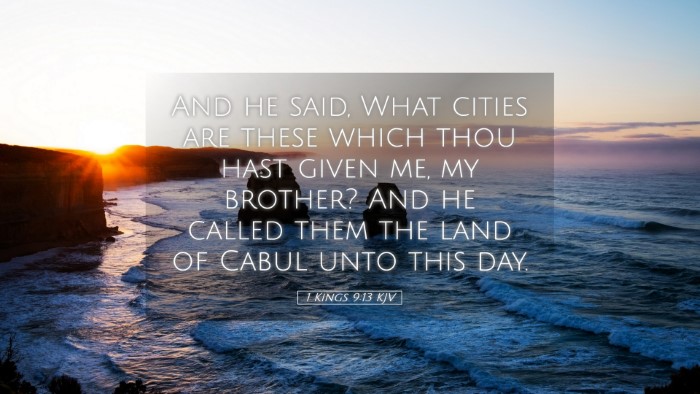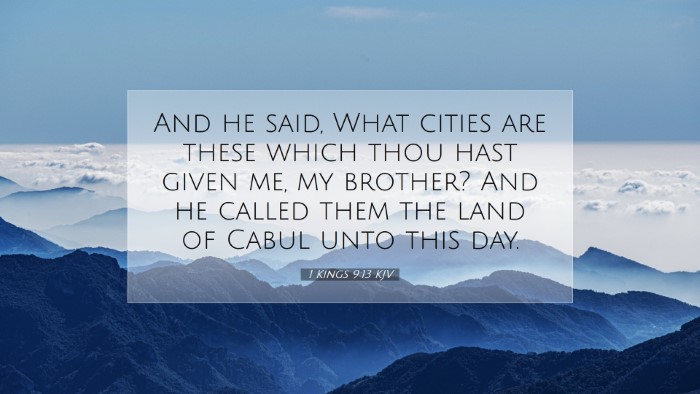Commentary on 1 Kings 9:13
Verse Reference: 1 Kings 9:13 - “And he said, What cities are these which thou hast given me, my lord? And he said, These are the cities which I have given thee to inhabit. And he said, What are they that we have in your hands?”
Contextual Overview
The context of 1 Kings 9 emerges after Solomon has completed the construction of the Temple and his palace. His reign is characterized by peace and prosperity, but it is also essential to observe the dynamics between Solomon and Hiram, the king of Tyre. Hiram had been instrumental in providing materials and craftspeople for the construction projects in Israel, which establishes a diplomatic and economic partnership.
This incident reflects the complexities of relationships forged through political alliances and the implications of land ownership and settlement during a significant period in Israel’s history.
Insights from Matthew Henry
Matthew Henry's commentary emphasizes the significance of Hiram's contribution to the building of the Temple. He notes that considerable efforts and sacrifices were made, not merely in labor but also in spiritual investment. In offering cities to Hiram, Solomon was essentially recognizing the value Hiram provided through his assistance and friendship. However, the cities that Hiram received may not have been up to his expectations, which reflects on the relational tensions present even amidst alliances.
Henry elaborates on the symbolic meaning of these cities—cities of refuge and places of restoration. The dissatisfaction Hiram expresses serves as a reminder of the importance of mutual respect and fulfillment in relationships. Leaders must ensure that partnerships are beneficial, not just in material possessions but in value and standing.
Insights from Albert Barnes
Albert Barnes focuses on the geographical and historical implications of Hiram's cities. He suggests that this exchange is a reflection of the exchange of resources between two nations. The cities that are assigned to Hiram may represent not just land but also the wealth and prosperity associated with them. Barnes further posits that Hiram's discontent suggests a deeper longing for significance in the exchange beyond mere land title.
The dissatisfaction expressed by Hiram leads to a discussion on the nature of wealth and expectation. This raises questions about what leaders focus on—material possessions or the underlying respect and loyalty in alliances. Hiram, while gifted cities, does not find joy in what might be seen as inadequate recompense, hinting at what true wealth entails in relationships.
Insights from Adam Clarke
Adam Clarke provides a historical lens on the situation, illuminating the ambiguity surrounding the cities' status. In his commentary, Clarke emphasizes that the cities given to Hiram were likely not greatly prized for their agricultural potential or strategic value, leading to Hiram's expressed discontent. The mention of “which thou hast given me” highlights Hiram's feelings of inadequacy regarding the exchange.
Clarke's analysis includes the notion that this interaction illustrates the importance of adequate reciprocity in diplomatic relations. Hiram’s request for more valuable cities emphasizes that however beneficial a relationship may be, expectations play a crucial role in sustaining it. The implication here is that leaders must be attuned to the sentiments and aspirations of their allies to avoid discord.
Theological Reflections
This passage invites numerous theological considerations, particularly regarding leadership, stewardship, and the nature of gifts. Solomon's role in dealing with Hiram showcases the principles of duty and responsibility in leadership.
- Stewardship: Leaders are called to not only govern wisely but also to cultivate relationships grounded in mutual respect and understanding.
- Expectations in Relationship: Relationships between nations (and individuals) hinge upon meet expectations. Hiram’s unease exemplifies the chasm that can exist when leaders fail to recognize the depth of partnership required.
- Maturity in Leadership: There is a deep need for diplomatic leaders to appreciate that every interaction has ramifications and that the provision should align with shared expectations and mutual benefit.
Conclusion
The interplay between Solomon and Hiram in 1 Kings 9:13 serves as a profound narrative exploring themes of diplomacy, expectations, and the nature of contentment. The insights gained from Matthew Henry, Albert Barnes, and Adam Clarke present a multifaceted view of this text which emphasizes the necessity for leaders to engage with integrity and care in their partnerships. Such reflections are critical for pastors, scholars, and students alike as they navigate their own leadership contexts today.


